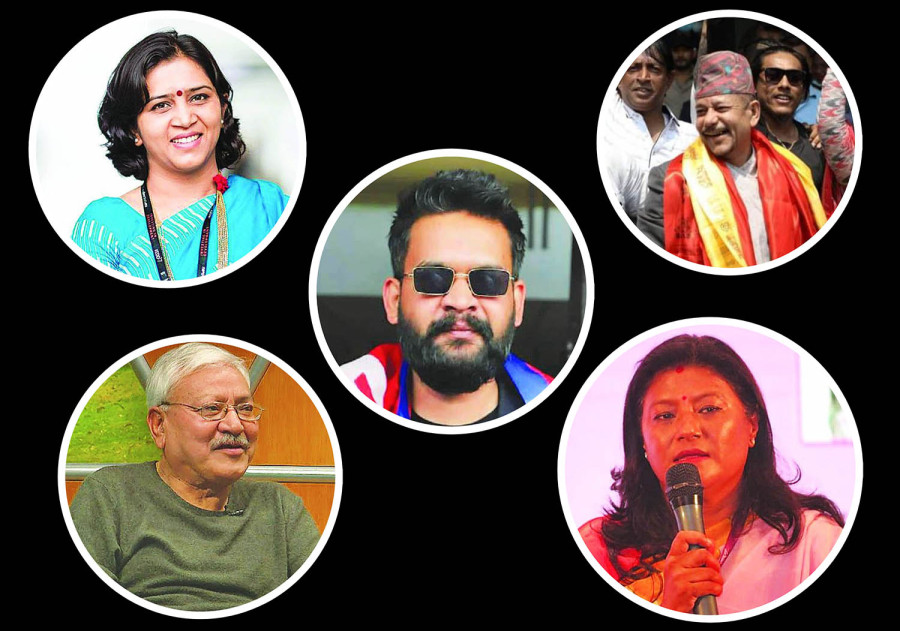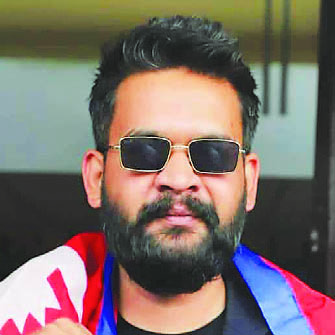Politics
Five candidates for Kathmandu mayor position to watch
An overview of prominent candidates eying Nepal’s most coveted local government post.
Binod Ghimire
The election for Kathmandu Metropolitan City office is always the centre of attraction because it is the largest metropolis in the country and the national capital.
With the Election Commission publishing the final list of candidates for the May 13 elections, over 50 candidates from various parties and independents are in the race for mayor of the metropolis.
The CPN-UML had won the mayoral position in the last two consecutive elections and wants to do a hat-trick this time. However, the candidate from the Nepali Congress who has the support of the five-party ruling coalition is also a strong contender. The Rastriya Prajatantra Party, which had forged an electoral alliance with the UML in 2017’s election, too is in the race but on its own.
In the previous polls, the candidate from Sajha Party, now Bibeksheel Sajha, was among the top five vote receivers. The party too has put all the efforts together for the upcoming elections. Among over a dozen independent candidates in the mayoral race, Balendra Shah (Balen) has garnered the most hype.
As the local election draws closer with the final list of candidates announced, the Post takes a look at the five most prominent candidates.
Keshav Sthapit—CPN-UML

A central committee member of the UML, Keshav Sthapit is a veteran politician, having held the mayoral position of Kathmandu metropolis twice—first, in 1997, on a CPN-UML ticket, and then in 2006, after then King Gyanendra assumed absolute power. Sthapit is remembered for his initiative to address encroachment of Maitighar Mandala and Pashupatinath Temple area. He had also taken controversial decisions to allow a private company to put hoarding boards in the state-owned areas, causing a loss in revenue for the metropolis, and let squatters to settle in the bank of Bagmati, among others. While Sthapit is known for taking prompt and bold decisions, many of his plans are often criticised for being unrealistic.
Though he got established in politics from the UML, his political career has been rather unstable. He sided with Bamdev Gautam when Gautam formed CPN-ML splitting from the UML. He became close to the palace when former King Gyanendra Shah seized the executive authority of the country. Sthapit then revived Praja Parisad, the oldest party in the country, but couldn’t succeed with it. He then joined Sanghiya Samajbadi Party and fought the second Constituent Assembly polls. After failures on the different fronts, he rejoined the UML in 2014. In 2017, he won as a member of Bagmati Province and also became a minister. He was sacked as the minister in 2018 following his differences with then chief minister Dormani Poudel and in the wake of allegations that he sexually harrassed two women. He continues to face the allegations.
Sthapit courted controversy yet again last week after he made contentious remarks against a woman who questioned him about the allegations at a public event in Kathmandu. In response to the query, he said, “You are a nice lady tara thutuno thhik chhaina…Should I publish a news report saying this sister is into prostitution?”—a remark that accompanied an exaggerated body language which many have interpreted as insensitive and misogynistic. As many as 45 organisations working in the advocacy of women's rights have demanded that his candidacy be withdrawn.
Srijana Singh—Nepali Congress

Srijana Singh hasn’t been in mainstream politics for the last few decades. Her name for the mayoral candidate was a surprise to many. Singh started her politics as a student leader of the Nepal Student Union, a sister wing of Nepali Congress. In 1979’s Free Students’ Union elections, she defeated Pampha Bhusal, now a CPN (Maoist Centre) leader and federal minister, to become the treasurer of the Free Students’ Union at Shankar Dev Campus, Putalisadak. In interviews, she has said she didn’t take any position in the party later because the “society doesn’t take positively if both husband and wife are in politics.”
Her husband, Prakash Man Singh, is a prominent Congress leader. Singh’s critics say she got the mayoral ticket not because of her strong political background but because of her family lineage. Prakash Man is the son of “iron man” Ganesh Man, who has made a huge contribution to the democratic movement in the country and is known for his selfless politics and his contribution to the state.
Singh has been defending herself saying she was in Congress politics earlier too; just that she hadn’t taken any position in the party. Being a common candidate from the five-party ruling alliance, she is a strong contender for the mayoral position.
Madan Das Shrestha—Rastriya Prajatantra Party

Madan Das Shrestha is a veteran actor who has performed in dozens of films and tele-serials since 1985. He is known for his decency and high achievement in his field. For the last few years, he has also made his name as a social worker. Until he was named as a mayoral candidate of the Rastriya Prajatantra Party, Shrestha wasn’t involved in politics directly.
The pro-Hindu and pro-monarchy party wants to cash in on his fame and professional achievement. In interviews, Shrestha has said he is contesting the mayoral position to end corruption and to prove that politics is not a career. “It is purely a service to the people and only honest leaders can live up to the expectations of the people,” he has said. In 2017’s local election, the RPP had formed an electoral alliance with the UML. While the UML’s Bidhya Sundar Shakya from the alliance won the poll, RPP’s Rajaram Shrestha conceded to Hari Prabha Khadgi as a deputy mayor from the Congress.
The party is contesting the local polls alone. It endured a split last year, with the party’s former chairperson Kamal Thapa leading the new breakaway party. The party leaders, however, maintain there is a wave in favour of the party after Rajendra Lingden became the party chairperson defeating Thapa.
Samikchya Baskota–Bibeksheel Sajha Party

Samikchya Baskota, a lawyer and businessperson by profession, had contested for the Bagmati Provincial Assembly member in 2017 but got defeated. The Sajha Party had contested for Mayor in the previous local elections wherein its candidate Kishor Thapa secured a sizable 18,492 votes. Similarly, Bibeksheel Party had fielded Ranju Darshana who received 34,854.
The two parties merged twice since the election and a section of the party led by Milan Pandey has been punished for not complying with the idea of party President Rabindra Mishra. It is not just that the party has seen multiple mergers and splits since the previous election, but the party’s ideology too has changed accordingly. Mishra, who said he adheres to the Constitution of Nepal, last year proposed the idea of scrapping federalism and holding a referendum on secularism. The powerful local levels in the present form are a part of federalism the Constitution of Nepal 2015 ensures.
In her interviews and interactions, Baskota appears confident and eloquent. However, the change in the party’s ideology and direction seem to be a challenge for her in the race for the mayoral position.
Balen Shah–Independent

Balen Shah, a rapper and structural engineer, had announced his candidacy even before the government had announced the date for the local polls. Balen has made his name among Nepali youths as a rapper following his acclaimed performance at the Raw Barz, a rap-battling league, in 2013. As youths comprise a large size of the electorate, Shah believes he will draw their votes in his favour. In interviews and interactions, Balen has been saying that as development is the core task of the local governments, a young engineer would be the ideal person to perform the job effectively.
Unlike the party-affiliated candidates, however, Shah doesn’t have a panel of candidates. Neither does he have an organisational structure to fall back on—which means he has to depend on swing voters to draw the results in his favour.




 9.89°C Kathmandu
9.89°C Kathmandu














